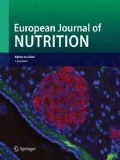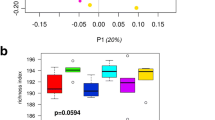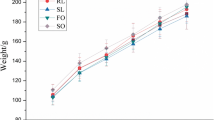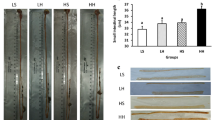Abstract
Purpose
Previous studies have shown that industrially originated trans-fatty acids (iTFAs) are associated with several chronic diseases, but the underlying mechanisms remain unknown. Because gut microbiota play a critical role in human health, diet competent induced gut microbiota dysbiosis may contributing to disease pathogenesis. Therefore, the present study examined the impact of iTFA on gut microbiota, help understanding the underling mechanism of iTFA-associated chronic diseases.
Methods
Forty male 8-week-old mice were divided into 4 groups and randomly assigned to diets containing soybean oil (non-iTFA) or partially hydrogenated soybean oil (iTFA). The intervention groups were: (1) low soybean oil (LS); (2) high soybean oil (HS); (3) low partially hydrogenated oil (LH) and (4) high partially hydrogenated oil (HH). The gut microbiota profiles were determined by 16S rRNA gene sequencing. Physiological parameters and the inflammatory status of the small intestine and other tissues were analyzed. Short-chain fatty acid levels in feces were measured using gas chromatography.
Results
The intake of iTFA increased the abundance of well-documented ‘harmful’ bacteria, such as Proteobacteria and Desulfovibrionaceae (P < 0.05), whereas it decreased relative abundance of ‘beneficial’ bacteria, such as Bacteroidetes, Lachnospiraceae, Bacteroidales S24-7 (P < 0.05). Surprisingly, the intake of iTFA increased the abundance of the probiotic Lactobacillaceae (P < 0.05). Additionally, the intake of iTFA induced increase of inflammatory parameters, as well as a numerical decrease of fecal butyric acid and valeric acid.
Conclusions
This study, to our knowledge, is the first to demonstrate that the consumption of iTFA resulted in a significant dysbiosis of gut microbiota, which may contribute to the development of chronic diseases associated with iTFA.








Similar content being viewed by others
Abbreviations
- TFA:
-
Trans-fatty acid
- iTFA:
-
Industrial originated trans-fatty acids
- SCFA:
-
Short-chain fatty acid
- GC:
-
Gas chromatography
- IBD:
-
Inflammatory bowel disease
- SRB:
-
Sulfate-reducing bacteria
- IL6:
-
Interleukin 6
- TNF-α:
-
Tumor necrosis factor alpha
- NAFLD:
-
Nonalcoholic fatty liver disease
- NASH:
-
Nonalcoholic steatohepatitis
References
Sekirov I, Russell SL, Antunes LC, Finlay BB (2010) Gut microbiota in health and disease. Physiol Rev 90(3):859–904. https://doi.org/10.1152/physrev.00045.2009
Round JL, Mazmanian SK (2009) The gut microbiota shapes intestinal immune responses during health and disease. Nat Rev Immunol 9(5):313–323. https://doi.org/10.1038/nri2515
Cani PD, Bibiloni R, Knauf C, Waget A, Neyrinck AM, Delzenne NM, Burcelin R (2008) Changes in gut microbiota control metabolic endotoxemia-induced inflammation in high-fat diet-induced obesity and diabetes in mice. Diabetes 57(6):1470–1481. https://doi.org/10.2337/db07-1403
Brennan CA, Garrett WS (2016) Gut microbiota, inflammation, and colorectal cancer. Annu Rev Microbiol 70:395–411. https://doi.org/10.1146/annurev-micro-102215-095513
Velagapudi VR, Hezaveh R, Reigstad CS, Gopalacharyulu P, Yetukuri L, Islam S, Felin J, Perkins R, Boren J, Oresic M, Backhed F (2010) The gut microbiota modulates host energy and lipid metabolism in mice. J Lipid Res 51(5):1101–1112. https://doi.org/10.1194/jlr.M002774
Macfarlane GT, Blackett KL, Nakayama T, Steed H, Macfarlane S (2009) The gut microbiota in inflammatory bowel disease. Curr Pharm Des 15(13):1528–1536
De Filippo C, Cavalieri D, Di Paola M, Ramazzotti M, Poullet JB, Massart S, Collini S, Pieraccini G, Lionetti P (2010) Impact of diet in shaping gut microbiota revealed by a comparative study in children from Europe and rural Africa. Proc Natl Acad Sci USA 107(33):14691–14696. https://doi.org/10.1073/pnas.1005963107
Daniel H, Gholami AM, Berry D, Desmarchelier C, Hahne H, Loh G, Mondot S, Lepage P, Rothballer M, Walker A, Bohm C, Wenning M, Wagner M, Blaut M, Schmitt-Kopplin P, Kuster B, Haller D, Clavel T (2014) High-fat diet alters gut microbiota physiology in mice. ISME J 8(2):295–308. https://doi.org/10.1038/ismej.2013.155
Zhang C, Zhang M, Pang X, Zhao Y, Wang L, Zhao L (2012) Structural resilience of the gut microbiota in adult mice under high-fat dietary perturbations. ISME J 6(10):1848–1857. https://doi.org/10.1038/ismej.2012.27
Etxeberria U, Fernandez-Quintela A, Milagro FI, Aguirre L, Martinez JA, Portillo MP (2013) Impact of polyphenols and polyphenol-rich dietary sources on gut microbiota composition. J Agric Food Chem 61(40):9517–9533. https://doi.org/10.1021/jf402506c
Chassaing B, Koren O, Goodrich JK, Poole AC, Srinivasan S, Ley RE, Gewirtz AT (2015) Dietary emulsifiers impact the mouse gut microbiota promoting colitis and metabolic syndrome. Nature 519(7541):92–96. https://doi.org/10.1038/nature14232
Hildebrandt MA, Hoffmann C, Sherrill-Mix SA, Keilbaugh SA, Hamady M, Chen YY, Knight R, Ahima RS, Bushman F, Wu GD (2009) High-fat diet determines the composition of the murine gut microbiome independently of obesity. Gastroenterology 137(5):1716–1724. https://doi.org/10.1053/j.gastro.2009.08.042
Yu HN, Zhu J, Pan WS, Shen SR, Shan WG, Das UN (2014) Effects of fish oil with a high content of n-3 polyunsaturated fatty acids on mouse gut microbiota. Arch Med Res 45(3):195–202. https://doi.org/10.1016/j.arcmed.2014.03.008
Micha R, Mozaffarian D (2009) Trans fatty acids: effects on metabolic syndrome, heart disease and diabetes. Nat Rev Endocrinol 5(6):335–344. https://doi.org/10.1038/nrendo.2009.79
Okada Y, Tsuzuki Y, Ueda T, Hozumi H, Sato S, Hokari R, Kurihara C, Watanabe C, Tomita K, Komoto S, Kawaguchi A, Nagao S, Miura S (2013) Trans fatty acids in diets act as a precipitating factor for gut inflammation? J Gastroenterol Hepatol 28(Suppl 4):29–32. https://doi.org/10.1111/jgh.12270
Smith BK, Robinson LE, Nam R, Ma DW (2009) Trans-fatty acids and cancer: a mini-review. Br J Nutr 102(9):1254–1266. https://doi.org/10.1017/S0007114509991437
Wilczek MM, Olszewski R, Krupienicz A (2017) Trans-fatty acids and cardiovascular disease: urgent need for legislation. Cardiology 138(4):254–258. https://doi.org/10.1159/000479956
Ley RE, Turnbaugh PJ, Klein S, Gordon JI (2006) Microbial ecology: human gut microbes associated with obesity. Nature 444(7122):1022–1023. https://doi.org/10.1038/4441022a
Kuczynski J, Stombaugh J, Walters WA, Gonzalez A, Caporaso JG, Knight R (2012) Using QIIME to analyze 16S rRNA gene sequences from microbial communities. Curr Protoc Microbiol. https://doi.org/10.1002/9780471729259.mc01e05s27 (Chap. 1:Unit 1E 5)
Quast C, Pruesse E, Yilmaz P, Gerken J, Schweer T, Yarza P, Peplies J, Glockner FO (2013) The SILVA ribosomal RNA gene database project: improved data processing and web-based tools. Nucleic Acids Res 41(Database issue):D590–D596. https://doi.org/10.1093/nar/gks1219
Wu Q, Shah NP (2014) Effects of elaidic acid, a predominant industrial trans fatty acid, on bacterial growth and cell surface hydrophobicity of lactobacilli. J Food Sci 79(12):M2485–M2490. https://doi.org/10.1111/1750-3841.12695
Liu W, Crott JW, Lyu L, Pfalzer AC, Li J, Choi SW, Yang Y, Mason JB, Liu Z (2016) Diet- and genetically-induced obesity produces alterations in the microbiome, inflammation and wnt pathway in the intestine of Apc(+/1638N) mice: comparisons and contrasts. J Cancer 7(13):1780–1790. https://doi.org/10.7150/jca.15792
Fan P, Liu P, Song P, Chen X, Ma X (2017) Moderate dietary protein restriction alters the composition of gut microbiota and improves ileal barrier function in adult pig model. Sci Rep 7:43412. https://doi.org/10.1038/srep43412
Zhao X, Jiang Z, Yang F, Wang Y, Gao X, Wang Y, Chai X, Pan G, Zhu Y (2016) Sensitive and simplified detection of antibiotic influence on the dynamic and versatile changes of fecal short-chain fatty acids. PLoS One 11(12):e0167032. https://doi.org/10.1371/journal.pone.0167032
Segata N, Izard J, Waldron L, Gevers D, Miropolsky L, Garrett WS, Huttenhower C (2011) Metagenomic biomarker discovery and explanation. Genome Biol 12(6):R60. https://doi.org/10.1186/gb-2011-12-6-r60
Atal S, Zamowski MJ, Cushman SW, Sampugna J (1994) Comparison of body weight and adipose tissue in male C57BI/6J mice fed diets with and without trans fatty acids. Lipids 29(5):319–325. https://doi.org/10.1007/BF02537184
Dotan I, Werner L, Vigodman S, Weiss S, Brazowski E, Maharshak N, Chen O, Tulchinsky H, Halpern Z, Guzner-Gur H (2010) CXCL12 is a constitutive and inflammatory chemokine in the intestinal immune system. Inflamm Bowel Dis 16(4):583–592. https://doi.org/10.1002/ibd.21106
Hernandez-Ruiz M, Zlotnik A (2017) Mucosal chemokines. J Interferon Cytokine Res 37(2):62–70. https://doi.org/10.1089/jir.2016.0076
Mikami S, Nakase H, Yamamoto S, Takeda Y, Yoshino T, Kasahara K, Ueno S, Uza N, Oishi S, Fujii N, Nagasawa T, Chiba T (2008) Blockade of CXCL12/CXCR4 axis ameliorates murine experimental colitis. J Pharmacol Exp Ther 327(2):383–392. https://doi.org/10.1124/jpet.108.141085
Turnbaugh PJ, Ridaura VK, Faith JJ, Rey FE, Knight R, Gordon JI (2009) The effect of diet on the human gut microbiome: a metagenomic analysis in humanized gnotobiotic mice. Sci Transl Med 1(6):6ra14. https://doi.org/10.1126/scitranslmed.3000322
Mozaffarian D, Katan MB, Ascherio A, Stampfer MJ, Willett WC (2006) Trans fatty acids and cardiovascular disease. N Engl J Med 354(15):1601–1613. https://doi.org/10.1056/NEJMra054035
Dinakaran V, Rathinavel A, Pushpanathan M, Sivakumar R, Gunasekaran P, Rajendhran J (2014) Elevated levels of circulating DNA in cardiovascular disease patients: metagenomic profiling of microbiome in the circulation. PLoS One 9(8):e105221. https://doi.org/10.1371/journal.pone.0105221
Shin NR, Whon TW, Bae JW (2015) Proteobacteria: microbial signature of dysbiosis in gut microbiota. Trends Biotechnol 33(9):496–503. https://doi.org/10.1016/j.tibtech.2015.06.011
Mujico JR, Baccan GC, Gheorghe A, Diaz LE, Marcos A (2013) Changes in gut microbiota due to supplemented fatty acids in diet-induced obese mice. Br J Nutr 110(4):711–720. https://doi.org/10.1017/S0007114512005612
Hwang I, Park YJ, Kim YR, Kim YN, Ka S, Lee HY, Seong JK, Seok YJ, Kim JB (2015) Alteration of gut microbiota by vancomycin and bacitracin improves insulin resistance via glucagon-like peptide 1 in diet-induced obesity. FASEB J 29(6):2397–2411. https://doi.org/10.1096/fj.14-265983
Yamashita T, Emoto T, Sasaki N, Hirata KI (2016) Gut microbiota and coronary artery disease. Int Heart J 57(6):663–671. https://doi.org/10.1536/ihj.16-414
Tomasova L, Konopelski P, Ufnal M (2016) Gut bacteria and hydrogen sulfide: the new old players in circulatory system homeostasis. Molecules 21(11). https://doi.org/10.3390/molecules21111558
Figliuolo VR, Dos Santos LM, Abalo A, Nanini H, Santos A, Brittes NM, Bernardazzi C, de Souza HSP, Vieira LQ, Coutinho-Silva R, Coutinho C (2017) Sulfate-reducing bacteria stimulate gut immune responses and contribute to inflammation in experimental colitis. Life Sci 189:29–38. https://doi.org/10.1016/j.lfs.2017.09.014
Ijssennagger N, van der Meer R, van Mil SWC (2016) Sulfide as a mucus barrier-breaker in inflammatory bowel disease? Trends Mol Med 22(3):190–199. https://doi.org/10.1016/j.molmed.2016.01.002
Endo Y, Kamisada S, Fujimoto K, Saito T (2006) Trans fatty acids promote the growth of some Lactobacillus strains. J Gen Appl Microbiol 52(1):29–35
Zeng H, Liu J, Jackson MI, Zhao FQ, Yan L, Combs GF Jr (2013) Fatty liver accompanies an increase in Lactobacillus species in the hind gut of C57BL/6 mice fed a high-fat diet. J Nutr 143(5):627–631. https://doi.org/10.3945/jn.112.172460
Consolandi C, Turroni S, Emmi G, Severgnini M, Fiori J, Peano C, Biagi E, Grassi A, Rampelli S, Silvestri E, Centanni M, Cianchi F, Gotti R, Emmi L, Brigidi P, Bizzaro N, De Bellis G, Prisco D, Candela M, D’Elios MM (2015) Behcet’s syndrome patients exhibit specific microbiome signature. Autoimmun Rev 14(4):269–276. https://doi.org/10.1016/j.autrev.2014.11.009
Reeves AE, Koenigsknecht MJ, Bergin IL, Young VB (2012) Suppression of Clostridium difficile in the gastrointestinal tracts of germfree mice inoculated with a murine isolate from the family Lachnospiraceae. Infect Immun 80(11):3786–3794. https://doi.org/10.1128/IAI.00647-12
Wang T, Cai G, Qiu Y, Fei N, Zhang M, Pang X, Jia W, Cai S, Zhao L (2012) Structural segregation of gut microbiota between colorectal cancer patients and healthy volunteers. ISME J 6(2):320–329. https://doi.org/10.1038/ismej.2011.109
Marques TM, Wall R, O’Sullivan O, Fitzgerald GF, Shanahan F, Quigley EM, Cotter PD, Cryan JF, Dinan TG, Ross RP, Stanton C (2015) Dietary trans-10, cis-12-conjugated linoleic acid alters fatty acid metabolism and microbiota composition in mice. Br J Nutr 113(5):728–738. https://doi.org/10.1017/S0007114514004206
Del Chierico F, Nobili V, Vernocchi P, Russo A, Stefanis C, Gnani D, Furlanello C, Zandona A, Paci P, Capuani G, Dallapiccola B, Miccheli A, Alisi A, Putignani L (2017) Gut microbiota profiling of pediatric nonalcoholic fatty liver disease and obese patients unveiled by an integrated meta-omics-based approach. Hepatology 65(2):451–464. https://doi.org/10.1002/hep.28572
Obara N, Fukushima K, Ueno Y, Wakui Y, Kimura O, Tamai K, Kakazu E, Inoue J, Kondo Y, Ogawa N, Sato K, Tsuduki T, Ishida K, Shimosegawa T (2010) Possible involvement and the mechanisms of excess trans-fatty acid consumption in severe NAFLD in mice. J Hepatol 53(2):326–334. https://doi.org/10.1016/j.jhep.2010.02.029
Neuschwander-Tetri BA, Ford DA, Acharya S, Gilkey G, Basaranoglu M, Tetri LH, Brunt EM (2012) Dietary trans-fatty acid induced NASH is normalized following loss of trans-fatty acids from hepatic lipid pools. Lipids 47(10):941–950. https://doi.org/10.1007/s11745-012-3709-7
Henkel J, Coleman CD, Schraplau A, Jhrens K, Weber D, Castro JP, Hugo M, Schulz TJ, Kramer S, Schurmann A, Puschel GP (2017) Induction of steatohepatitis (NASH) with insulin resistance in wildtype B6 mice by a western-type diet containing soybean oil and cholesterol. Mol Med. https://doi.org/10.2119/molmed.2016.00203
Jeyapal S, Putcha UK, Mullapudi VS, Ghosh S, Sakamuri A, Kona SR, Vadakattu SS, Madakasira C, Ibrahim A (2017) Chronic consumption of fructose in combination with trans fatty acids but not with saturated fatty acids induces nonalcoholic steatohepatitis with fibrosis in rats. Eur J Nutr. https://doi.org/10.1007/s00394-017-1492-1
Sun J, Kato I (2016) Gut microbiota, inflammation and colorectal cancer. Genes Dis 3(2):130–143. https://doi.org/10.1016/j.gendis.2016.03.004
Kavanagh K, Jones KL, Sawyer J, Kelley K, Carr JJ, Wagner JD, Rudel LL (2007) Trans fat diet induces abdominal obesity and changes in insulin sensitivity in monkeys. Obesity (Silver Spring) 15(7):1675–1684. https://doi.org/10.1038/oby.2007.200
Chajes V, Biessy C, Ferrari P, Romieu I, Freisling H, Huybrechts I, Scalbert A, Bueno de Mesquita B, Romaguera D, Gunter MJ, Vineis P, Hansen CP, Jakobsen MU, Clavel-Chapelon F, Fagherazzi G, Boutron-Ruault MC, Katzke V, Neamat-Allah J, Boeing H, Bachlechner U, Trichopoulou A, Naska A, Orfanos P, Pala V, Masala G, Mattiello A, Skeie G, Weiderpass E, Agudo A, Huerta JM, Ardanaz E, Sanchez MJ, Dorronsoro M, Quiros JR, Johansson I, Winkvist A, Sonested E, Key T, Khaw KT, Wareham NJ, Peeters PH, Slimani N (2015) Plasma elaidic acid level as biomarker of industrial trans fatty acids and risk of weight change: report from the EPIC study. PLoS One 10(2):e0118206. https://doi.org/10.1371/journal.pone.0118206
Machado RM, Stefano JT, Oliveira CP, Mello ES, Ferreira FD, Nunes VS, de Lima VM, Quintao EC, Catanozi S, Nakandakare ER, Lottenberg AM (2010) Intake of trans fatty acids causes nonalcoholic steatohepatitis and reduces adipose tissue fat content. J Nutr 140(6):1127–1132. https://doi.org/10.3945/jn.109.117937
Funding
This project is supported by National Natural Science Foundation of China (31401487).
Author information
Authors and Affiliations
Corresponding authors
Ethics declarations
Conflict of interest
On behalf of all authors, the corresponding author states that there is no conflict of interest.
Electronic supplementary material
Below is the link to the electronic supplementary material.
Rights and permissions
About this article
Cite this article
Ge, Y., Liu, W., Tao, H. et al. Effect of industrial trans-fatty acids-enriched diet on gut microbiota of C57BL/6 mice. Eur J Nutr 58, 2625–2638 (2019). https://doi.org/10.1007/s00394-018-1810-2
Received:
Accepted:
Published:
Issue Date:
DOI: https://doi.org/10.1007/s00394-018-1810-2




